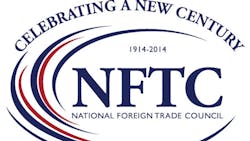US Trade Group Will Work with Trump, Defend Free Trade Rules
WASHINGTON—A century-old U.S. trade group on Monday pledged to work with the incoming administration to improve access to overseas markets for American companies, but also to fight against protectionism.
Rufus Yerxa, head of the 300-company National Foreign Trade Council, said his organization is prepared to work with President-elect Donald Trump to improve conditions for U.S. exporters.
However, he declined to be drawn into discussing some of Trump's more inflammatory statements, like threats to impose huge punitive tariffs on China and renegotiate free trade deals, saying he would wait to see what the actual policies are.
"The reason I want to be optimistic is because I've seen this before, prior incoming administrations where there's a lot of dire predictions about what's going to happen, and in the end very positive things have happened," said Yerxa, a former deputy director general of the World Trade Organization.
"I don't want to rule out that possibility," he told reporters. "I think we can make progress once it becomes clear to people that protectionism isn't the answer."
Yerxa presented the NFTC's newest policy brief which favors many policies Trump has been pushing: better trade rules for US exporters, reduced corporate taxes and big spending to improve infrastructure.
However, the organization, which accounts for about $3 trillion in worldwide sales, stresses the importance of a rules-based system where all countries, including the United States, abides by the global trade rules and keep markets open.
"And we're prepared to argue against the use of trade restrictions as a way of achieving greater economic growth -- history has shown that really isn't an effective way of doing that," he said.
The NFTC also recognizes that while one in five Americans depend on trade for their jobs, many have been left behind by globalization and technological change -- an anti-trade sentiment that was a big part of Trump's success.
The group also urges a major focus on worker adjustment and retraining, something the US lags well behind other major countries.
Yerxa said if done right, with these programs coupled with lower taxes, free trade and improved infrastructure, "there will be a lot less need for politicians to be focusing on taking counterproductive trade actions as a way of solving our economic problems."
Copyright Agence France-Presse, 2016
About the Author
Agence France-Presse
Copyright Agence France-Presse, 2002-2025. AFP text, photos, graphics and logos shall not be reproduced, published, broadcast, rewritten for broadcast or publication or redistributed directly or indirectly in any medium. AFP shall not be held liable for any delays, inaccuracies, errors or omissions in any AFP content, or for any actions taken in consequence.
